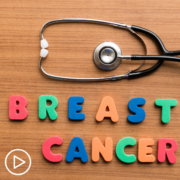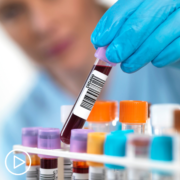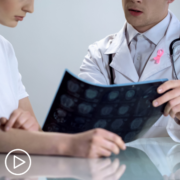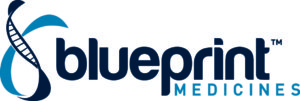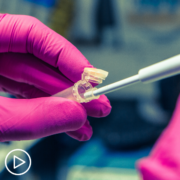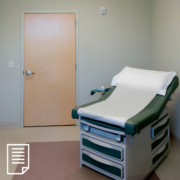Which Metastatic Breast Cancer Treatment Is Right for You? What You Need to Know from Patient Empowerment Network on Vimeo.
What do you need to know before deciding which treatment is best for YOUR metastatic breast cancer? Expert Dr. Jane Meisel reviews recent research news, discusses the role of key tests–including biomarker testing –in determining a treatment plan, and shares advice for self-advocacy.
Jane Lowe Meisel, MD is an Associate Professor of Hematology and Medical Oncology at Winship Cancer Institute at Emory University. Learn more about Dr. Meisel, here.
[Editor’s Note: On August 23, 2021, the U.S. Food and Drug Administration (FDA) approved the Pfizer-BioNTech COVID-19 Vaccine for individuals 16 years of age and older.]
Download Program Guide
See More From INSIST! Metastatic Breast Cancer
Related Resources:
Transcript:
Katherine:
Hello and welcome. I’m Katherine Banwell, your host for today’s program. In today’s webinar, we’ll discuss how you can access the most personalized metastatic breast cancer therapy for your individual disease and why it’s vital to insist on key testing. Before we meet our guest, let’s review a few more important details. The reminder email you received about this program contains a link to program materials.
If you haven’t already, click that link to access information to follow along during the webinar. At the end of this program, you’ll receive a link to a program survey. Please take a moment to provide feedback about your experience today, in order to help plan future webinars. And finally, before we get into the discussion, please remember, this program is not a substitute for seeking medical advice. Please refer to your healthcare team – Please refer to your healthcare team about what might be best for you.
All right, let’s meet our guest today. Joining us is Dr. Jane Meisel. Dr. Meisel, welcome. Would you please introduce yourself?
Dr. Meisel:
Absolutely and thank you so much for having me. My name is Jane Meisel and I’m a medical oncologist at the Winship Cancer Institute at Emory University. I’ve been here for about six years and before that, I did my training in Boston and at Memorial Sloan-Kettering in New York. And I specialize in breast cancer and have had a lot of great opportunities to treat amazing patients and participate in a lot of research.
And I’m looking forward to having this discussion with you today.
Katherine:
Thank you for joining us, we really appreciate it. So, let’s start by discussing the latest developments in treatment and research updates. Are there recent developments you feel breast cancer patients should know about?
Dr. Meisel:
Absolutely and I think it’s really been such a remarkable time because even during COVID, a pandemic, where I think a lot of people worried that research efforts would shut down or stall. We’ve still seen the approval of a number of drugs in the past year that’ve really already markedly changed lives. And a lot of important findings that’ve come out of other trials that they have opportunity to do that as well.
I think some of the biggest information that was presented at our most recent large meeting, which was the American Society of Clinical Oncology, or ASCO National Meeting in 2021, were a few things that pertain to the metastatic breast cancer population. One was two studies, the PALOMA-3 Trial and the MONALEESA-3 Trial, which looked at a class of drugs called CDK4-6 inhibitors along with anti-estrogen pills in metastatic estrogen-positive breast cancer.
And really confirm for patients that not only do these drugs improve the amount of time that people can stay on treatment before their cancer progresses, but actually improve how long people live. Even when they’re used very, very early on in treatment, they impact survival down the line for many, many years. So, it really confirms for physicians like me that this class of drugs should be used as the standard of care and first line for patients with estrogen-positive stage IV breast cancer, and I think that’s important for patients to know. Along those lines, there a drug called sacituzumab govitecan, or Trodelvy, which is a much easier to say name.
Katherine:
Yes.
Dr. Meisel:
A new antibody drug conjugate in triple-negative metastatic breast cancer. And we’ve also seen, since this drug was approved last year, it has markedly changed the lives of many patients with triple-negative disease. And the study called the ascent trial, which is what led to that drug’s approval was studied further and some of these additional results presented at ASCO this year.
And found that this drug not only improves again, how long people get before they have to move on to another treatment, but actually improves how long people live as well, even when given later on in the course of therapy. So again, really encouraging use especially in triple-negative metastatic disease, which is hard to treat. And I think another study that’s really worth patients and doctors taking a hard look at, was actually a study that looked at patient outcomes and patient experience. This is a study that actually talked with metastatic patients and gathered their views on treatment related adverse effects.
Talked to patients about what adverse effects they were experiencing from drugs. How they managed those adverse effects. And found that most patients, over 90%, will be willing to talk about reducing the dose of drugs or changing dosing schedules, in order to improve quality of life. And I think that’s really important because a lot of times, the doses of drugs that get approved are the doses that are the highest doses that don’t cause extreme toxicity. But sometimes people can have effective, really good outcomes on lower doses and have much better quality of life.
And in metastatic breast cancer where really the goal often times is to help people live as long as they can, but also as importantly, as well as they can, be able to have those open-ended conversations between patients and doctors about what’s really impacting your quality of life now and how can we make that better is important. And this study I think really highlighted that both for patients and physicians, how important that back and forth is to having a successful outcome. Both in terms of how life is lived, but in terms of quality of that life.
Katherine:
Right. Right. How can patients stay up to date on developing research?
Dr. Meisel:
It’s so interesting because there is so much coming out and I think it can be hard to figure out what Phase I study that looks exciting is really going to become something, versus what really could be important in my treatment today. And what I always tell people is actually, the NCI website. So, the National Cancer Institute, has a phenomenal page looking at advances in breast cancer research. So, if you Google “NCI advances in breast cancer research,” there’s a great page that comes up. And it’s impressively up to date and I think very patient-friendly.
Breaks things down into early stage and metastatic and then in the metastatic section, talks about estrogen-positive, HER2-positive, triple-negative, which we can talk about more today but are the three big subtype of metastatic disease that dictate how we treat them. And then have links to all the different research updates and talk about what these drugs are, what the classes are and what the settings are in which they’re studied.
And so, I think that’s a really great first stop and then the links can take you to all different stuff that’s on the page that you might want to look into more in depth. And then also, the Breast Cancer Research Foundation, which is a phenomenal organization. They have a great website, too and if you click around on the website, you can see not only who they’ve donated money to that’s doing promising research, they also have podcasts, they have a blog with science and research news. I think that’s a really great site for patients to use to stay updated.
Katherine:
Let’s shift gears for a moment and talk about another time sensitive topic, COVID. Now that vaccines are available, are they safe and effective for breast cancer patients?
Dr. Meisel:
Yeah, I think the short answer to that is yes, absolutely. I’m encouraging all my patients, no matter what their treatment status is to go ahead and get vaccinated. And we are seeing now this third surge in COVID with cases rising all over the country, and really among unvaccinated populations. And with the delta variant being more transmissible, I think it’s all the more time, even if you haven’t considered vaccination up until now, to really go ahead and strongly consider getting a vaccine.
I think some of the hesitations that some of the people have talked to me about is that there were not a lot of active cancer patients, if any, included in the initial trials. And whereas that is true, it’s still the case that now, so many cancer patients have been vaccinated. We haven’t really heard about adverse effects in vaccination being something that’s higher in patients who have cancer who are on active treatment. I think the one challenge is, if you have a compromised immune system because of cancer treatment, there’s the possibility that you might not mount the same immune response to the vaccine as someone who doesn’t have cancer or isn’t getting active treatment.
So, while I would say yes, definitely get vaccinated, I would also at the same time encourage caution in saying, because you might not mount the same, 95 percent or whatever immune response, it may still be a good idea to wear a mask when you go to the grocery store, taking those precautions because no one really knows what’s coming and it’s better to be safe than sorry. But I think we will get a lot of information as the months go on about, do we need boosters? Who might need boosters more soon than others and some of that will get clarified for us, but my short answer would be yes, vaccines for all.
Katherine:
Excellent, that’s very helpful.
Dr. Meisel:
Thank you.
Katherine:
Since this webinar is focused on metastatic disease, would you define metastatic breast cancer for us?
Dr. Meisel:
Absolutely. And I think metastatic breast cancer is one of those terms that as doctors, we throw around a lot and often times don’t stop to check understanding as to what that means.
And what metastatic breast cancer is and means, is breast cancer that is spread outside of the breast and surrounding lymph nodes to another organ system. So, metastatic breast cancer, some of the most common places where it spreads are to the bone, to the skin, to the lungs, to the liver, to the brain. There are other places it can spread to. I’ve seen it on the ovaries, in the GI tract. But basically, when breast cancer spreads outside of the breast and surrounding lymph nodes to another organ system, that’s when we consider it metastatic.
Katherine:
How can a patient ensure they are getting an accurate diagnosis?
Dr. Meisel:
Another good question. And I think the most important thing when you’re considering whether or not you have a diagnosis of metastatic breast cancer is to get a biopsy of that metastatic site. So, you wouldn’t want to assume, just based on a CT scan that shows something in the bone that you have metastatic disease. Ideally, we would biopsy that spot or some spot that was indicative of metastatic disease to actually prove that there is metastatic cancer in that distant site.
Because sometimes it’s nothing. Sometimes you get scans and a little bone abnormality, maybe a scar from a prior fall. And then also, sometimes if it is metastatic, sometimes the breast cancer, the hormone receptor status, for example, can change from the primary site to the metastatic site. And that might impact treatment. So, it’s important to both get a metastatic biopsy to confirm diagnosis. And also, to understand what the treatment plan might be. And I think also for patients, just to make sure that you understand what your stage is, ask your doctor.
Say, what is my stage? Because sometimes doctors think people understand and they don’t actually, so checking that understanding is important. But if your doctor or provider is not actively checking your understanding, you can check it with them to make sure that if you are metastatic or have Stage IV disease, which is another way we define metastatic or talk about metastatic cancer, that you make sure you have the definition right.
Katherine:
Right, right. So, once someone has been diagnosed with metastatic disease, are there key tests that’re used to help understand how their disease may behave and progress?
Dr. Meisel:
Absolutely. So, I think the first thing as I said is that metastatic biopsy. Another thing that’s very important is understanding the hormone receptor status and the HER2 status of the breast cancer. And probably for a lot of you listening, if you have listened to metastatic breast cancer webinars before or maybe know someone or have had a diagnosis yourself, you’re well versed in this. But for some who may not be, I think a quick overview is maybe helpful. Breast cancer can be divided into three different subtypes. So, triple-negative, estrogen-positive or HER2-positive. And estrogen-positive breast cancer is the most common kind.
That tends to be driven by hormones and often treated with what we call, endocrine therapy. So, anti-estrogen pills, things like Tamoxifen or aromatase inhibitors are examples of that. And that’s one kind. And then there’s HER2-positive breast cancer, which is a type of breast cancer that over expresses a marker called HER2. And we now, since we know about that marker, have been able to develop a lot of different treatments that target HER2 selectively.
And can be used to treat that subtype. And then triple-negative is basically estrogen-negative, progesterone-negative and HER2-negative. And that type of breast cancer traditionally was treated essentially only with chemotherapy. But now we’ve had some breakthroughs, which we’ll talk about I think later in this program talking about immunotherapy and more targeted therapy for that. But those subtypes help determine how we treat patients. And it also can sometimes predict behavior.
I would say one of the other things that helps us predict behavior of metastatic disease is, if a patient had early-stage disease before, how quickly they developed metastatic disease. So, for example, someone who develops estrogen-positive metastatic breast cancer 12 years out from their original diagnosis is statistically more likely to have a slower progressing course of disease than someone who develops triple-negative metastatic disease very soon after their initial treatment. So, I would say that’s the primary thing we look at in terms of determining treatment plan and then predicting overall course.
Katherine:
Right. Well, let’s talk about treatment options for advanced disease.
Can you review the types of treatments available for metastatic breast cancer?
Dr. Meisel:
Absolutely. And what I’ll do is, I’ll give you a broad overview and then because there’s so much and this is such a rich environment, I mean, I give hour long lectures just about the treatment of metastatic triple-negative breast cancer to our fellows. So, there is so much meaty information here. But I’ll give an overview with some key buzzwords so then people can go look up things that matter more to them or interest them more. So, as I said, we start with thinking about, is this hormone receptor-positive or estrogen-positive breast cancer? Is this HER2-positive or is this triple-negative? And those factors really send us down different paths.
So, if someone is estrogen-positive, I had mentioned before the PALOMA and MONALEESA studies showing that CDK4-6 inhibitors, which is a class of drugs that the first one was approved in 2015 and then two others have been approved subsequently. So, relatively new drugs. But those drugs, which are pills, added to traditional anti-estrogen therapy which would be aromatase inhibitors or fulvestrant.
Are often great first-line options for these patients. And people can do well for years on just that alone, with estrogen-positive metastatic breast cancer. On average, about two years before people progress and need something new. And then after that, there are lots of trials ongoing looking at different ways in which an estrogen-positive breast cancer might progress on that regiment and how do we target that. So that there are multiple other anti-estrogen options down the line that people can use in estrogen-positive breast cancer before they need to even think about going on to something like chemotherapy.
So, really lots and lots of options for those patients, but probably starting with a CDK4-6 inhibitor plus anti-estrogen combination. And then in HER2-positive breast cancer, typically the first-line treatment would be what we call monoclonal antibodies directed at HER2. So, something like Herceptin and Perjeta, which you may have heard of. And often combined with chemotherapy. But again, this is one of those areas that is also very, I think the art of medicine is very important and patient dependent.
Some of these regiments depend a little bit on patient’s age and other medical problems and desires, whether to include chemotherapy along with that frontline anti-HER2 regimen. Or whether to think about something like anti-estrogen therapy if the patient is HER2-positive and estrogen-positive. And then there are a lot of other different things we’re also using in HER2-positive disease after patients progress on that initial therapy, so there are what we call, antibody drug conjugates, where a chemotherapy like drug is attached to an antibody that then brings the chemo to the HER2-positive cell and allows for chemotherapy penetration more directly.
And then a class of drugs called tyrosine kinase inhibitors, which are oral drugs that get directed at HER2. So, another really exciting area to treat and a place where we’ve seen so many advances. And then in triple-negative breast cancer, I’d mentioned that chemotherapy has really been the mainstay of treatment historically because there weren’t great targets. But recently we’ve seen that immunotherapy, along with chemotherapy drugs like Keytruda, which you may have heard of.
Or atezolizumab, which is Mesenteric, can be used along with chemo and patients that overexpress a molecule called, PDL1. And that can actually include not just how long patients spend on the first treatment, but how long they live. So, we’re seeing a lot of triple-negative patients being great candidates for immune-based regimen now. And then for patients who have inherited a BRCA gene mutation, which many of you may have heard of. That gene mutation can actually predispose a triple-negative patient to be more receptive to a class of drugs called PARP inhibitors.
So, drugs like olaparib (Lynparza) or talazoparib (Talzenna) are new drugs that’ve been approved in the last couple of years in triple-negative metastatic breast cancer for patients who carry a BRCA1 mutation or BRCA2 mutation. And then there are also antibody drug conjugates in triple-negative breast cancer as well. The Trodelvy that’s been approved and then of course others that are in clinical trials currently. So, as you can see, it’s complex. I mean, the treatment of metastatic breast cancer is complicated. And so, it’s important I think to really be able to have a dialogue with your provider about what they’re recommending for you and why.
And I think there are often lots of options. And so, as much as you can make your doctor aware of what matters to you in terms of what side effects are you most afraid of or would you like most to avoid, what dosing schedules would be idea for your schedule for the rest of your life. So that you can deal with taking kids to school or the job that you’re currently working on or whatever, I think helps your doctor help you come up with the right regiment for you.
Katherine:
Yeah. Yeah. So, what factors are considered when deciding on the best treatment approach for an individual patient?
Dr. Meisel:
So, I think certainly the tumor type that we were talking about. Is it estrogen-positive or HER2-negative or HER2-positive? I think response to past treatments, both in terms of if someone has had metastatic disease for a long time and has had a few treatments already, how long did they respond to those treatments and how completely did they respond to those treatments. Did they have stable disease for a while or did their cancer actively shrink?
And then I think other than that, it would be some of the things I touched on. Side effect profiles. Do patients have pre-existing neuropathy from other chemotherapy? If so, maybe you want to avoid a regiment that causes more neuropathy. Schedule. Some patients, it’s really important to be on a certain schedule, as opposed to a different schedule. I think whether there are clinical trials available instead of whatever the standard of care regiment would be is also important.
Because for some patients who are interested in pushing the envelope or who might be a great candidate for a particular trial, if there is one that they’re a candidate for that’s not horribly inconvenient from a logistics standpoint, then trials I think are also a great option to consider. So, I think from an effectiveness standpoint, you want to think about the tumor type response to past treatments. And then potentially, if the patient has had, what we call genomic profiling, where the tumor has been sent for basically genomic analysis, to see what genes might be mutated in the tumor that could potentially drive a response to a newer, different therapy.
All those things can be taken into account as we think about the cancer. But then there is the patient specific factors, and I think those would be mainly side effects, schedule, clinical trials and desire or not to pursue those. And then, just what the patient’s perspective is on the plan that you’re offering them.
Katherine:
What is biomarker testing and how do results impact treatment options?
Dr. Meisel:
Great question. So, I think people often confuse germline mutations and somatic mutations. So, I’ll talk about that a little bit as we talk ab out biomarkers. So, I think biomarkers in general are factors within the tumor that allow us to make treatment decisions. So, if a biomarker in the tumor can predict response to a certain type of treatment, we want to know what that biomarker is so we can better treat the patient and more elegantly design a regimen. So, for example, having an estrogen-positive tumor, estrogen positivity is a biomarker suggestive of response to anti-estrogen treatments, which is why we give anti-estrogen therapy to ER-positive breast cancers.
But more recently, we’ve been able to move a little bit beyond estrogen, HER2- and triple-negative as our subtypes and think a little bit more in some patients about more sophisticated biomarkers. And that’s where somatic mutation testing comes in. So, there are germline mutations, which are inherited mutations that’re present in every cell in your body. So, for example, if your mother was a BRCA mutation carrier and based that BRCA mutation down to you, you would have a germline BRCA mutation. So, your cancer would carry a BRCA mutation, but so would every other cell you have.
And that’s a biomarker. That would make you a candidate for something like a PARP inhibitor. But in cancers, which the genes in the cancer have gone awry by definition, there are often other biomarkers within that tumor that may make you a candidate for certain treatments. And so, those mutations that arise in the cancer itself are called, somatic mutations. Those are mutations in the tumor, can’t be passed down to your offspring or anything like that and were not inherited by your parents. But mutations that’ve accumulated over time as these cancer cells have gone awry.
And so, genomic testing, or biomarker testing can be done often on a metastatic specimen. So, to be specific about it, say you had a metastatic breast cancer to the liver. You could have a liver biopsy done and that tissue from the liver biopsy could be sent for genomic testing. There are a lot of companies that do this and there are also some larger cancer centers that actually do in house testing for genomics. So, this testing can be done and what it does then is, it helps you determine, do you have a biomarker that predisposes you to a certain treatment.
So, if that metastatic liver tissues, for example contained high levels of PBL1 expression for example and you were triple-negative, that would say to your doctor, “Ooh, this is a great candidate for immunotherapy along with chemotherapy.” Or if you’re estrogen-positive, for example, and your tumor contains a mutation in the gene called PIK3CA and that might make you a candidate for a drug called, alpelisib (Piqray). So, these mutations could often be paired to a drug or treatment options, or sometimes to a clinical trial to allow patients to come take advantage of more targeted therapies.
That sometimes, because they’re targeted, have fewer side effects than drugs that are a little more discriminate.
Katherine:
Marie sent in this question prior to the program. Are there some genetic tests that’re more accurate than others?
Dr. Meisel:
That’s a good question. I would say most genetic testing platforms have been heavily vetted and approved by national organizations and laboratories that’ve been tested multiple times before they’re allowed to be marketed. So, I wouldn’t say that one genetic testing program is necessarily better than another. I think that any of the commercially available platforms that’re used are probably pretty accurate.
Katherine:
Okay. How does symptom management play into the treatment decision?
Dr. Meisel:
I was just going to add one thing to that, if that’s okay. I was going to say that I think it’s important when you’re using genetic testing platforms though to know what you’re testing for. So, there are some platforms that will just test for say, the three most common mutations in BRCA1 and BRCA2 that Ashkenazi Jews have.
And so, if you get that testing back and you’re negative, you might think oh, I don’t have a mutation in those genes. Well, we know from that testing, just as an example, is that you don’t have a mutation in those three alleles of that gene. But if you haven’t had full gene sequencing, you could have a mutation somewhere else in that gene. So, I would say all genetic testing that’s commercially available is probably pretty accurate. But it is important when you get testing done to know what you’re testing for and what you’re not testing for so you can interpret your results accurately. And genetic counselors, as well as your doctors can help you do that.
Katherine:
Right, right. Okay, I’m going to ask the question, this question again. How does symptom management play into the treatment decision?
Dr. Meisel:
I think symptom management is huge, because like I said and I tell this to all my patients at the outset of treatment that most of the time, metastatic breast cancer becomes a chronic diagnosis for a patient. You’re dealing with it, essentially like a chronic illness for the rest of your life. And you’re on some form of treatment for the most part, for the foreseeable future.
And so, making sure quality of life is as good as it can be is critically important. And I think symptom management is a huge part of that and we know that if we can treat and manage symptoms well, people can live better and often live longer because then they can stay on treatment for more extensive periods of time comfortably. And so, I always encourage patients, don’t be a martyr.
Don’t think you have to just bounce in here and tell me everything’s okay if it’s not okay. If you’re having symptoms and side effects from treatment, or from the cancer, I want to know about them so that we can really aggressively manage those symptoms just like we’re aggressively managing the cancer. A lot of times oncologists can do that on their own. We are pretty well versed in managing a lot of symptoms and side effects.
But a lot of times also, there are teams of doctors either who do palliative care or here at Emory, we call it supportive oncology where they are specially trained in things like pain management and managing more common side effects like nausea, constipation, diarrhea, appetite suppression, that can go along with cancer and with treatment.
And then they often will co-manage patients with us as well, just to make sure there’s that really strong focus on maintaining as much of a low symptom burden as possible.
Katherine:
So, you mentioned earlier, clinical trials. When should patients consider participating in a trial?
Dr. Meisel:
I think it’s a great question and I think the answer is really, almost any time. There are trials in every setting. So, I think one of the common misconceptions about clinical trials is that you really only should be in a clinical trial, or your doctor might only mention a clinical trial if they don’t have other options for you or if you’re really in stage. And I think that perception is changing. But I think the reality is that there are clinical trials in every setting.
So, we have clinical trails looking at prevention of breast cancer. Clinical trials looking to optimize early-stage treatment of breast cancer. Clinical trials looking at secondary prevention, so once you’ve had breast cancer, how can we reduce your risk of recurrence. And then lots of clinical trials in the metastatic setting both for patients who are initially diagnosed with metastatic breast cancer.
And then in second, third, fourth line and even for patients who have had tons and tons of additional therapy that we’re looking at new drugs for. So, I think at almost any juncture where you’re making a treatment change, it’s probably appropriate to say, would there be a clinical trail that you can think of that would be good for me in this setting? And it may be that there’s a one that’s 12 hours away, and it’s not convenient for you or feasible.
And it may be that your doctor doesn’t necessarily know of one but then that prompts them to ask a colleague who may be more involved in clinical trial design and development. Or it may be that there is one, but you ultimately choose not to pursue it because you have a different option. But I think it’s always appropriate to ask, would there be a trail for me? Because if there is, then maybe that opens up an option you hadn’t thought about before.
Katherine:
Sure. For patients who aren’t familiar with the stages of clinical trials, would you give us a brief overview of the stages?
Dr. Meisel:
Yeah. Absolutely. So, in terms of clinical trials that’re being done in humans, we talk about Phase I, Phase II and Phase III typically. So, a Phase II clinical trial is typically an earlier stage trial.
Looking at either a drug that has not been tested in humans before or a drug that has not been tested in a particular combination in humans before. And so, those trials are done only in select institutions, usually academic institutions as opposed to private hospitals. And they often have what’s called a dose finding phase and then a dose escalation phase. So, the earliest part of those trials is actually looking at, what is the safest dose to give to patients?
So, they start the first patients at a low dose of the compound. And if those patients do well, the next patients that’re enrolled get enrolled at a slightly higher dose. And then up until they reach the highest dose they can find where people are tolerating it and doing reasonably well. And in those Phase I trials, doctors and investigators are also evaluating efficacy, is this drug working. But the primary goal of the early phase trial is actually to find the right dose to then study in larger groups. And so, if they find the right dose and there’s good biological rationale for the compound, then the trial would go on to a Phase II.
Which might be just what we call single arm Phase II study, where every patient is getting that experimental drug. And we monitor them to see, is the drug effective, or is it less effective than the standard of care? Or sometimes they’re what we call, randomized Phase II trials where patients are randomized to either get the experimental drug, or to get what the standard of care would be in that situation. I think a lot of people get afraid about the idea of a randomized trial because they’re afraid they’re going to be randomized to a placebo. And that is really not done in the metastatic setting, because it wouldn’t be ethical to give a patient with active cancer a placebo.
So, usually the randomization would be either to the study compound or to a standard of care drug. And then if things look good in a Phase II trial, then a Phase III study is done which is usually what the FDA requires to allow a drug to go on and be administered outside of a study for approval. And those Phase III trials tend to be larger studies that’re done in larger groups of patients with more statistical validity because of their size, to determine, is this drug really better than the standard.
Katherine:
Right. We have another question we received earlier, this one from Eileen. She asks, how will I know whether my treatment is working?
Dr. Meisel:
That’s a really good question. So, I think for patients who have symptoms from their cancer, they often will know the drug is working because their symptoms improve. Say if you have lung metastases and you are short of breath and your shortness of breath gets better. That’s a really good sign that the treatment is working. I would say that often what we are doing, and it depends a little bit on the regimen and what the patient is getting and how often they’re coming in.
But we’re checking labs as well and sometimes there are lab abnormalities when a patient is diagnosed with metastatic cancer that can then improve over time. So, for example, if someone has a heavy burden of bone involvement with breast cancer, there’s a lab value called the alkaline phosphatases that will often be elevated. If that starts elevated and comes down, that’s a really good sign. And some of their liver function tests that we check and if a patient has liver metastases, we often will see those come down if a patient is responding.
There are also, what we call tumor markers that we can check in patients with metastatic breast cancer. Those would be proteins in the blood basically that can be made by the breast cancer in abundance. And those are called CA27-29 and CA15-3. Some doctors check both of them. Some will just check one depending on which one their laboratory at their institution is running. But typically, I will check those at diagnosis of metastatic disease. And then if it’s elevated, I know it’s a good marker to follow for my patient. And then I’ll follow that monthly or every three weeks, depending on when the patient is coming in to see me.
And if I see that marker start to go down, it’s not an absolute, but it can be a good early indicator of improvement with the treatment. And then I think it varies a little bit from practice to practice and based on patient preference. But often there will be scans done when a patient is initially diagnosed to determine the extent of the disease. So, usually a CT scan of the chest and the abdomen and the pelvis or a PET scan, which some of you may have heard of. Either one of those is good.
And that can be done about every 12 weeks usually in the beginning, to make sure a patient is responding and once you feel confident that they are, those can be done sell frequently. So, I would say the scans and the lab work and then the patient’s overall condition are usually the way that we look to see, are we having a response or not.
Katherine:
We’ve talked about several key tests. Some patients may be confused about whether they’ve received these tests. So, what questions should they ask their physician to make sure they’re getting appropriate testing?
Dr. Meisel:
I think it’s probably useful because not everybody needs every test, and I think there are often things you hear about online or from friends or even in a webinar like this, and there may be a good reason why you haven’t had that particular test. So, I wouldn’t assume that if you haven’t had everything that we’ve talked about today even, that someone’s made a mistake or that you need that and aren’t getting it. But I would ask. I think it’s always helpful to know more, knowledge is power. And so, if you have never had a CT scan or a CA27-29 level or a genomic testing.
I think it’s not a bad thing if you’re curious about it, to just ask your treating team, “Hey, I heard about genomic testing, is there a reason I haven’t had that? Or have I had that?” Maybe you have, and they called it something else. I think it is complicated, but I think it helps to understand what you’ve had done and what you haven’t had done. And sometimes, asking about something like that may prompt the team to do things that my benefit you.
Katherine:
Before we wrap up, Dr. Meisel, how do you feel about the future of breast cancer research and what would you like patients to know?
Dr. Meisel:
Yeah, I think one of the most important things and I actually said this to a family this morning where a loved one had received a new diagnosis of metastatic breast cancer is that the field has evolved so much over the past five years. I think often when people get a diagnosis of metastatic breast cancer, it’s the most dreadful feeling they ever had. They remember that day for the rest of their lives. But we are seeing so many people do so well for so long now and tolerate treatments well because the treatments are better tolerated.
And there’s I think more attention being paid now to symptom management. That people really can do so much better than they’ve been doing. And I would say really, every year, even every six months, when I go to give a lecture on a topic in metastatic breast cancer, I can’t just give the same talk. I’m always having to update my slides because there’s so many new things coming out, so much new research on the table.
And we’re seeing so many new drug approvals now that we’re starting to unlock some of these new mutations and reasons for progression and understanding new drug classes. So, really think it is a bright time to be in breast cancer research, and there’s never been a better time to be a patient if you have to fall into that category.
Katherine:
It all sounds so promising, Dr. Meisel. Thank you so much for joining us today.
Dr. Meisel:
You’re so welcome. Thank you for having me.
Katherine:
And thank you to all of our partners. If you would like to watch this webinar again, there will be a replay available soon. You’ll receive an email when it’s ready. Also, don’t forget to take the survey immediately following this webinar. It will help us as we plan future programs.
To learn more about breast cancer and to access tools to help you become a proactive patient, visit PowerfulPatients.org. I’m Katherine Banwell, thanks for joining us.




